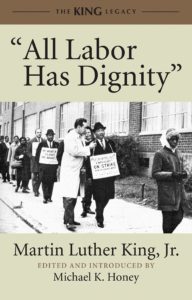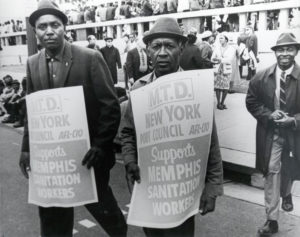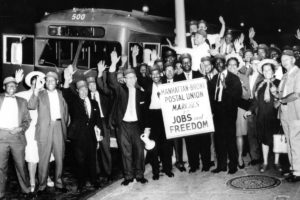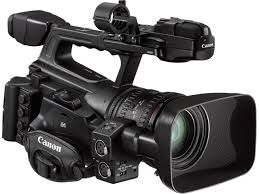The following remarks were made by BWFJ member Ajamu Dillahunt during a Martin Luther King Holiday event sponsored by the Raleigh & Durham Workers’ Assemblies.
Good morning, Brothers and Sisters, comrades, and friends! Welcome to this important event at a critical time in the history of the US. I want to express my gratitude to the Raleigh & Durham Workers Assemblies for asking me to share a few thoughts about Dr. King and his support for Labor.
Every year in January since 1986 we are confronted with what I call the struggle for Dr. King’s legacy. The corporate media, the corporations themselves, the schools and the religious institutions serve up a version of Dr. King that stripped him of the analysis and vision that propelled him through decades of struggle. The focus on his “I Have A Dream” speech and his advocacy of non-violence ignores, if not buries, his view on labor, the economy, war and so much more that is relevant to our struggle for survival, much less social transformation.
Our friend, Charles McKinney, one of our most important historians in this moment suggested that these institutions are “Killing King Again.” James Earl Ray’s bullets took his life on the balcony of the Lorraine Motel and today a  well-financed and orchestrated assassination of his body of work has taken place. Charles calls it Martin Luther King, Jr. 2.0. For people seeking the truth and those seeking to end exploitation and oppression, we have to ground ourselves in King 1.0 and enter this struggle for ideas and even more important, take ACTION.
well-financed and orchestrated assassination of his body of work has taken place. Charles calls it Martin Luther King, Jr. 2.0. For people seeking the truth and those seeking to end exploitation and oppression, we have to ground ourselves in King 1.0 and enter this struggle for ideas and even more important, take ACTION.
We say that for Workers the best way to celebrate Dr. King’s Legacy is to Organize, Fight for A Union, For Dignity at Work. So let’s briefly put that in context.
If we start with the 1963 speech, we should keep in mind that the March on Washington was for Jobs and Freedom; jobs and freedom. It was called to deal with crippling unemployment of Black people across the country as well as the fight for democratic rights.
But Dr. King was no stranger to the struggles of labor and unions. During the early 1960’s and up until his death he was a supporter of workers struggles. He understood how strong unions in the struggle against the employers was critical to the economic well being of Black workers both in and outside of unions. He spoke at numerous conventions of national and local unions as well as AFL-CIO Conventions. His engagement was not simply seeking support for civil rights work in the South but to share his analysis of what should be the natural and necessary relationship between organized labor and the civil rights movement.
In his speech to the AFL-CIO in 1961 he offers a class analysis of the Black community and a call for unity: “Negroes are almost entirely a working people. There are pitifully few Negro millionaires, and few Negro employers. Our needs are identical with labor’s needs — decent wages, fair working conditions, livable housing, old age security, health and welfare measures, conditions in which families can grow, have education for their children and respect in the community. That is why Negroes support labor’s demands and fight laws which curb labor. That is why the labor-hater and labor-baiter is virtually always a twin-headed creature spewing anti-Negro epithets from one mouth and anti-labor propaganda from the other mouth”
For us in the South we need to remember how clear he was about the region. King was clear about the South and labor At the 1965 Illinois AFL-CIO Convention he said: The South is labor’s other deep menace. Lower wage rates and improved transportation have magnetically attracted industry. The wide-spread, deeply-rooted Negro poverty in the South weakens the wage scale there for the white as well as the Negro. Beyond that, a low wage structure in the South becomes a heavy pressure on higher wages in the North.
Dr. King had a strong relationship with the Retail Warehouse Distrbution Workers Union-RWDSU. He supported their contract fights. For example, he was with them in their fight at Bloomingdale’s Department store in NYC in the early 1960’s. They in turn were key organizers for the M

Members of the New York Maritime Trades support striking sanitation workers of AFSCME Memphis Local 1733 by participating in the memorial march for Martin Luther King.
April 8, 1968
arch on Washington. And we should take note, fast forwarding, that it was the RWDSU that organized Amazon workers in Alabama for a union election last year, tying their work to their legacy with Dr. King.
Unknown to many was his support for Scripto workers in Atlanta. Some of you may have seen a picture of him with a picket sign saying support Scripto workers. Labor Historian Mike Honey reports that not long after Dr. return to the US from receiving his Nobel Peace Prize, he joined the workers at the plant not too far from his home church Ebenezer Baptist. He was on the picket line and even reached out to the company ( although we might not appreciate his direct contact with them as a rank and file led movement), he was dedicated to supporting them through action.
Dr. King’s labor legacy of course is best seen and noted through his support for the Memphis Sanitation workers. While some of his aides tried to dissuade him from taking time away from the preparations for the Poor Peoples March, he understood the relationship between the strike for safety, higher wages and dignity and the struggle against poverty.
 And of course, it was in Memphis where he laid out the notion that “ All Labor has dignity.” This not only had an impact on the consciousness of the strikers and their supporters but is an ongoing call to end the divisions among the ranks of workers based on the type of work we do, how clean it is, how much it pays, not to mention race, religion, gender, sexual orientation, and immigration status.
And of course, it was in Memphis where he laid out the notion that “ All Labor has dignity.” This not only had an impact on the consciousness of the strikers and their supporters but is an ongoing call to end the divisions among the ranks of workers based on the type of work we do, how clean it is, how much it pays, not to mention race, religion, gender, sexual orientation, and immigration status.
The huge legacy of Dr. Kings support for labor showed up in N. C. in four sanitation workers strikes in Charlotte between 1968 and 1971. And in Rocky Mt. in 1978. And in Raleigh in 2006. And that legacy should guide all our work today. Not in the background, but in the foreground.
But let’s be clear, Dr. King didn’t think we were just dealing with some funky employers. He saw it as systemic. As early as 1953 he shared with his wife to be, Coretta Scott, his anti-capitalist views. He had an understanding of the relationship of the economic system and racism, of white supremacy. And he called it out. Although you don’t hear it in King 2.0. He lifted up the triplets of racism, materialism and militarism. He called for the redistribution of wealth in general and reparative justice for the ancestors of the enslaved.
In his opposition to militarism, he called out the US aggression in Vietnam even knowing it would lose him support among politicians, especially Lyndon Johnson, but even other Civil Rights leaders. He was right there with Kwame Ture, then known as Stokely Carmichael, and the Student Non-Violent Coordinating Committee, condemning the crimes against the Vietnamese people as they fought for self-determination. He opposed imperialist war and the US foreign policy that it was, and is, built on.
So King was a revolutionary, considered dangerous by those who wanted to maintain the status quo. His views on labor, capitalism and war are the basis on which our movement today must be built and strengthened. It’s how we take advantage of the upsurge of workers through strikes and organizing that we are witnessing. It’s how we honor him. It’s how we uphold his legacy.
I’ll end by borrowing from a slogan from the 1970’s : “Dr.King, Be like him, Dare to Struggle, Dare to Win!”
1/15/22



